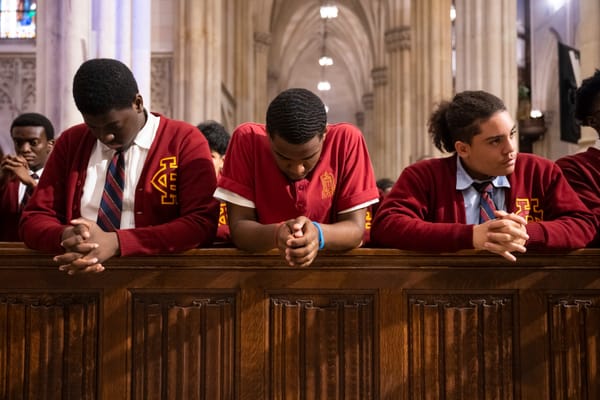Catholic-school parents in New York bear a double financial burden: paying their kids’ tuitions on top of the public-school tax they still are obligated to fork over for a service they don’t use. By any measure, this is a sacrifice, one they take on willingly—even enthusiastically—for a variety of reasons.
Some tell us it’s for the fine academics of Catholic schools, which often far exceed their government-school counterparts. Others rightly note the fact that our schools prioritize our religious faith and values. Some put a premium on the order and discipline that are hallmarks of our schools: from the uniforms to the zero tolerance for antisocial or disrespectful behavior toward teachers and fellow students. Still others see our schools as a refuge from the “woke agenda” of New York’s public-school bureaucracy and teachers’ unions.
For most, I’d hazard a guess, all of these factors come into play to some extent when making a decision to choose a Catholic education. Certainly, they all contribute to what makes our schools so successful.
Now it seems that, at least for some lawmakers, the very characteristics that set us apart and help us produce well-rounded, loving, and productive young women and men must be stamped out in favor of a gender ideology that would force us to deny the inherent differences between boys and girls. Doing so would undermine the core philosophy for which our parents choose the Church’s schools in the first place.
Let me explain: A bill that was introduced in the New York state legislature in the recently concluded legislative session would have prohibited “discrimination” in Catholic and other religious and nongovernmental schools for a variety of characteristics, including “gender,” which the bill defines as “actual or perceived sex,” including “a person’s gender identity or expression.”
In a nutshell, this section of the legislation could allow for claims of discrimination against a Catholic school for any of the following reasons: referring to a student by the pronouns that correlate to his or her actual (but not perceived) sex; requiring a student to wear the uniform that correlates to his or her actual (but not perceived) sex; requiring a student to use a bathroom or locker room that correlates to his or her actual (but not perceived) sex; or limiting participation in girls’ sports programs to biological girls.
You get the picture. Ironically, this mandate against “discrimination” based on “perceived gender” is part of a larger bill known as the Nonpublic Dignity for All Students Act, whose stated purpose is to address the issue of school bullying, similar to a 2010 law that specifically applied only to public schools.
In other words, one way the state would deal with school bullying is by bullying parents of children in Catholic or other religious and nongovernmental schools into submission with regard to gender politics. Essentially, they are telling our families: If you won’t toe the line and enroll your children in our government schools, we will force the policies of the government schools onto your schools.
Similar guidelines have been implemented in the government-run schools by the state Department of Education. We think these guidelines are a bad idea; our concern is heightened since most Catholic kids attend those schools, and I hear that some education officials and many parents realize that these proposals are misguided.
“This bill is essentially a solution in search of a problem.”
To be clear, childhood bullying is a serious problem, and Catholic schools certainly aren’t immune to it. However, there is no evidence whatsoever that bullying in our schools is an issue requiring state intervention. On the contrary, every Catholic school in the state has a policy to address bullying. And ultimately, we have a tool at our disposal that our public counterparts don’t: namely, the threat of expulsion of bad actors. Furthermore, if we don’t do our job, parents also have an important tool at their disposal that often government school parents don’t—they can vote with their feet and move their child to another school.
Thankfully, these tools rarely have to be wielded, as fostering an environment of respect for all is a cornerstone of our educational mission that our families and school personnel enthusiastically embrace. Tolerance for bullying is a complete anathema to the values of every Catholic school. This bill is essentially a solution in search of a problem.
Still, we certainly would be fine with legislation designed to foster civility in nonpublic schools and prevent bullying, however unnecessary it may be in reality. Unfortunately, the bill’s sponsors couldn’t be satisfied with that purpose. Instead, they are using the hook of “anti-bullying” to attempt a social coup d’état in all schools, Catholic ones included. Fortunately, even in Albany, enough lawmakers saw the inherent flaw—or at least, the political peril—of such an approach and the bill didn’t advance this session. Something tells me, though, that the threat of this unjust intrusion won’t be going away anytime soon.
